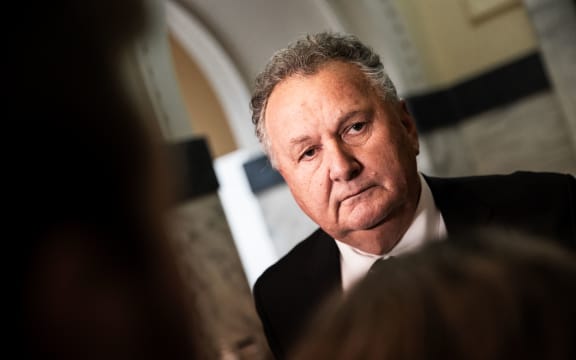By Lydia Lewis, RNZ Pacific journalist
A former Tuvalu prime minister says while the New Zealand government’s oil and gas plans show it is concerned about its economy, he is more concerned about the livelihoods and survival of the Tuvalu people.
Enele Sopoaga — who still serves as an MP in Tuvalu — says the climate crisis is the “main enemy”.
“There is nothing more serious and more important than that.”
His comments come after New Zealand’s Resources Minister Shane Jones said it was “left wing catastrophisation” to suggest that waters would be lapping at towns in Pacific countries as a result of the New Zealand government’s decision on gas and coal.

Vanuatu Climate Change Minister Ralph Regenvanu called on the New Zealand government not to reverse the ban at last year’s Pacific Islands Forum Leaders Meeting in Rarotonga.
“We call on them not to do it to be in line with Paris, in line with the 1.5 degree target. The science says you cannot [make] new fossil fuels,” he told RNZ Pacific in 2023.
Despite this, the current New Zealand government has backed its plans, which Tuvalu is not happy about.
‘It’s going to sink Tuvalu’
“Go ahead and drill and open up new coal mining or get new gas stations,” said Sopoaga, “but don’t forget that whatever you are going to do, it’s going to increase greenhouse gas emissions, which are going to sink the islands of Tuvalu and kill the people.
“It’s just as a matter of fact, as simple as that.”
Jones was asked by RNZ’s Morning Report how New Zealand’s Pacific neighbours would feel about restarting exploration of oil and gas, and the associated environmental impact.
Jones said the Pacific understood Aotearoa needed reliable energy to generate an economic dividend to then be able to contribute to the Pacific region.
“[New Zealand] keeping the lights on and the hospitals functioning, you can’t hold that type of thinking responsible for the tide lapping around Tuvalu. Come on, give us a break,” Jones said.
Sopoaga called the comments “daft” and “naive”.
“I think it’s a completely stupid idea,” he said.
‘Early demise, rising sea levels’
“It’s just logical — the more you open up new gases and the more release of greenhouse gases into the atmosphere will simply cause the early demise and rising of sea levels that will affect the islands of Tuvalu.
“I would appeal to New Zealand to rethink about doing that.”
Sopoaga was prime minister from 2013 to 2019. He was re-elected as an MP in this year’s election and is part of Tuvalu’s 16-member parliament.
He now wants Aotearoa to stick with its ban on fossil fuel exploration, and to also contribute to the cost of adaptation.
Sopoaga said he wanted to remind Jones that “we are working as a global team in the world”.
“Countries cannot just take up their own initiatives, and then go the wrong way.
“[We can not] go with the national interests of countries, we have to discipline ourselves so that we don’t break up and claim that we are doing what the Paris Agreement and Kyoto Protocol are telling us.
“In fact, the Paris Agreement is a legally binding framework, and you cannot just simply say we open up new oil fields in New Zealand and these will not affect the Pacific Island countries.
“This is a stupid idea,” Sopoaga said.
NZ urged to pacify US/China
New Zealand is sending a political delegation on a five-stop Pacific tour next week.
Foreign Affairs Minister Winston Peters has recently spoken about New Zealand’s relationship with China.
“We strongly believe that in a mature relationship like ours it is possible to discuss differences openly, respectfully, and predictably. We will continue to share our concerns with China, where we have them.
“China has a long-standing presence in the Pacific, but we are seriously concerned by increased engagement in Pacific security sectors. We do not want to see developments that destabilise the institutions and arrangements that have long underpinned our region’s security.”
Peters has said he is continuing work started by the previous government to consider partipation in AUKUS Pillar 2, but that New Zealand was a long way from making a decision.
“I think the role of New Zealand is to de-escalate and pacify the situation, talk to China, talk to Australia, talk to the US,” Sopoaga said.
“There is no enemy, their biggest enemy is climate change.
“They are only using this [AUKUS] as a camouflage to move away from responsibility and cause global warming. And they want to ignore their accountability, their responsibility to deal with it,” Sopoaga said.
This article is republished under a community partnership agreement with RNZ.
Article by AsiaPacificReport.nz






